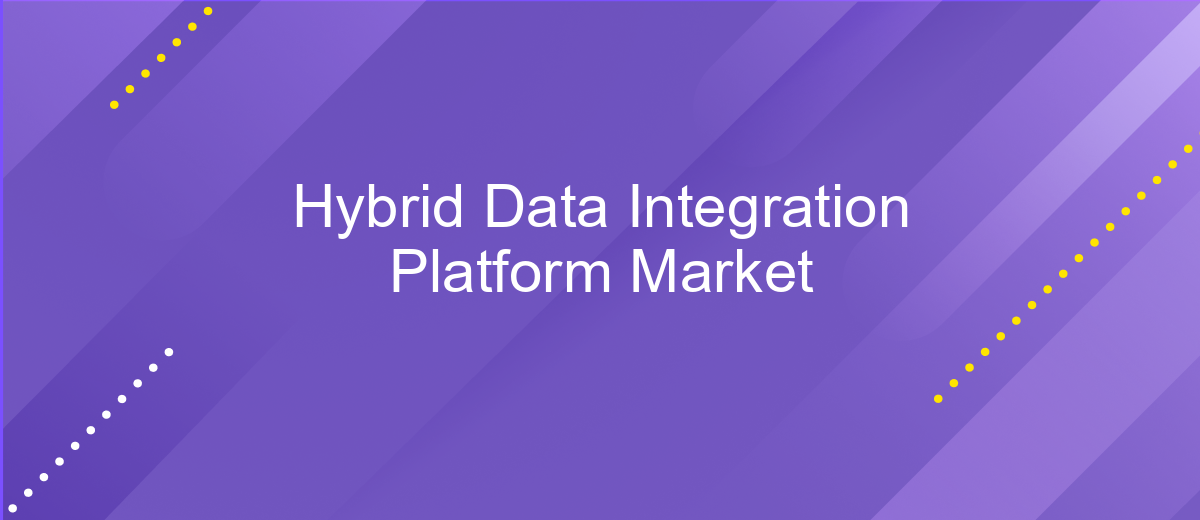Hybrid Data Integration Platform Market
The Hybrid Data Integration Platform Market is rapidly evolving as organizations increasingly seek solutions that seamlessly blend on-premises and cloud-based data sources. This market is driven by the growing demand for real-time data access, enhanced data management capabilities, and improved business agility. As businesses strive to harness the power of diverse data ecosystems, hybrid data integration platforms are becoming essential for achieving comprehensive and efficient data strategies.
Introduction to Hybrid Data Integration Platforms
Hybrid Data Integration Platforms (HDIPs) are essential tools in modern data management, offering a comprehensive solution for integrating data from diverse sources. These platforms enable organizations to seamlessly connect on-premises systems with cloud-based applications, facilitating efficient data flow and collaboration. As businesses increasingly adopt digital transformation strategies, the demand for HDIPs has surged, driven by the need for agility and scalability.
- Seamless integration of cloud and on-premises data sources
- Enhanced data governance and security measures
- Real-time data processing and analytics capabilities
- Scalability to accommodate growing data volumes
- Support for a wide range of data formats and protocols
In today's data-driven world, the ability to integrate and manage data effectively is crucial for business success. Hybrid Data Integration Platforms provide the flexibility and functionality required to meet these demands. By bridging the gap between disparate systems, they empower organizations to harness the full potential of their data assets, driving innovation and informed decision-making. As technology continues to evolve, HDIPs will play a pivotal role in shaping the future of data integration and management.
Market Drivers and Challenges

The Hybrid Data Integration Platform market is primarily driven by the increasing need for seamless data management across diverse environments, including on-premises, cloud, and hybrid setups. Organizations are striving for more efficient data processing and analytics to gain competitive advantages, leading to a growing demand for platforms that can integrate disparate data sources with minimal complexity. Additionally, the rise of IoT devices and big data analytics further fuels the need for robust integration solutions that can handle vast amounts of data in real-time. Solutions like ApiX-Drive play a crucial role in this landscape by providing user-friendly tools that simplify the integration process, enabling businesses to connect various applications and automate data workflows efficiently.
However, the market faces challenges such as data security concerns and the complexity of integrating legacy systems with modern cloud-based platforms. Ensuring data privacy and compliance with regulations like GDPR adds additional layers of complexity for businesses. Moreover, the rapid pace of technological advancements requires continuous updates and adaptability from integration platforms to stay relevant. Despite these challenges, the demand for hybrid data integration solutions continues to grow, driven by the need for agility and innovation in data management strategies.
Key Features and Benefits

The Hybrid Data Integration Platform Market is rapidly evolving, offering organizations a seamless way to manage and integrate diverse data sources. This platform bridges the gap between on-premises and cloud-based systems, ensuring data consistency and accessibility across various environments. By leveraging hybrid solutions, businesses can enhance their data strategy, optimizing both operational efficiency and decision-making processes.
- Scalability: Easily scale up or down based on organizational needs without compromising performance.
- Security: Robust security protocols protect sensitive data, ensuring compliance with industry standards.
- Flexibility: Support for a wide range of data formats and integration with various applications.
- Real-time Processing: Enables real-time data processing and analytics for timely insights.
- Cost Efficiency: Reduces operational costs by optimizing resource allocation and minimizing data redundancy.
Adopting a hybrid data integration platform empowers businesses to remain competitive in a data-driven world. By integrating disparate data sources, organizations can gain a comprehensive view of their operations, enabling more informed decision-making. Ultimately, this leads to improved business outcomes, driving innovation and growth while maintaining a secure and scalable infrastructure.
Competitive Landscape and Key Players

The Hybrid Data Integration Platform market is characterized by intense competition, driven by the demand for seamless data management solutions across diverse environments. Companies are striving to enhance their offerings by integrating advanced technologies like AI and machine learning to provide more efficient and scalable solutions.
Key players in this market are focusing on strategic partnerships, acquisitions, and product innovations to strengthen their market position. They are also investing in research and development to cater to the evolving needs of businesses seeking comprehensive data integration solutions.
- IBM Corporation
- Microsoft Corporation
- Oracle Corporation
- SAP SE
- Talend
These companies are recognized for their robust portfolios and strong global presence, enabling them to offer tailored solutions to a wide range of industries. Their commitment to innovation and customer-centric approaches positions them as leaders in the hybrid data integration platform market, driving growth and setting industry standards.


Future Trends and Market Outlook
The Hybrid Data Integration Platform Market is poised for significant growth as businesses increasingly seek solutions that seamlessly blend on-premises and cloud-based data. With the rise of big data and IoT, the demand for platforms that can efficiently manage and integrate diverse data sources is expected to surge. Companies are looking for agile and scalable integration solutions to ensure real-time data processing and analytics. This trend is further propelled by advancements in AI and machine learning, which enhance data integration capabilities and offer predictive insights, driving more informed decision-making.
In the coming years, we anticipate a shift towards low-code and no-code integration platforms, allowing non-technical users to configure integrations with ease. Services like ApiX-Drive are leading the way by offering user-friendly interfaces that simplify the integration process, enabling businesses to connect various applications without extensive IT intervention. As organizations prioritize digital transformation, the emphasis on robust, flexible, and cost-effective hybrid data integration solutions will continue to grow, shaping the future landscape of the market.
FAQ
What is a Hybrid Data Integration Platform?
What are the benefits of using a Hybrid Data Integration Platform?
How does a Hybrid Data Integration Platform manage data security?
What are the key features to look for in a Hybrid Data Integration Platform?
How can businesses automate and configure integrations using a Hybrid Data Integration Platform?
Strive to take your business to the next level, achieve your goals faster and more efficiently? Apix-Drive is your reliable assistant for these tasks. An online service and application connector will help you automate key business processes and get rid of the routine. You and your employees will free up time for important core tasks. Try Apix-Drive features for free to see the effectiveness of the online connector for yourself.

